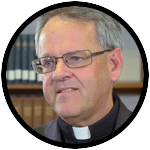
Father Thomas Dailey, O.S.F.S.
With summer now in full swing, outdoor concerts and festivals draw people young and old to enjoy listening to music. But this popular pastime also portends something more, at least according to the Vatican’s Synod of Bishops.
In preparation for the upcoming assembly on “Young People, the Faith and Vocational Discernment,” the synod recently published the Instrumentum Laboris, a lengthy working document of topics up for discussion. Among these is music, considered in terms of language, experience, and youth culture.
Not merely entertainment, music represents “the soundtrack of their lives” and “contributes to the formation of their identity” (no. 36). It triggers a socializing process of sights, sounds, and motions that “allow people to step outside themselves and to feel in tune with strangers” (no. 37). Listening to music connects the young to a dimension of interiority instrumental for their lives (no. 162).
[hotblock]
Music seems an unlikely topic for a meeting of bishops, whose tastes on the subject are likely to differ greatly from those of youth! Nevertheless, the synod’s paramount concern is to connect with the younger generation.
In a chapter on “listening to young people” (nn. 64-72), we read that they “are asking the Church to reach out to them to listen to and welcome them, offering dialogue and hospitality.” The document quotes one response from a bishops’ conference which says, “young people want a ‘less institutional and more relational’ Church.” From another conference we learn that “the young want to see a Church that shares their life situation in the light of the Gospel rather than preaches!”
The sound of the document is loud and clear – young people want to be heard. But, as with certain types of music, the lyrics here aren’t always decipherable. What exactly do young people desire from a Church that “listens” more?
If they want to be included in discussions, involved in processes, and generally taken into consideration because they can speak to the particular realities of their state-in-life, then, yes, by all means the Church should listen. The synod participants will gather to do just that.
But if wanting the Church to listen means to welcome viewpoints that diverge from professed beliefs, then the young are likely to be disappointed with the outcomes of the October gathering. The Church still must preach the Gospel and the faith that follows from it.
Religious listening matters most when it is attuned to the sound of the Spirit. The volume won’t reach the decibel level typical of outdoor concerts; the divine song resounds in the heart and is heard in the silence of the soul. Its melody underscores the need for “discernment.” Its rhythm beats with the constant call to “discipleship.”
The playlist of topics for the synod begins (no. 2) with an ode to discernment as “a way of life, a style, a fundamental attitude” of hearing the voice of the Lord. To discern is to listen; to listen is to obey (from the Latin ob “to” and audire “listen, hear”).
In obedience to the Holy Spirit, discernment engenders an “openness to new things, courage to move outwards, and resistance to the temptation of reducing what is new to what we already know.” It “can also become a driver for our actions, the ability to be creatively faithful to the one single mission the Church has always been entrusted with.”
To fulfill that mission, the Church surely needs to engage the next generation, by attending to their distinctive gifts and genuine needs. But young people also need to listen – by following the vocation in which the Lord calls each of them to be “missionary disciples” in the world.
The working document makes only one reference to this terminology (no. 199). But that biblical image dominates Pope Francis’ renewed vision of who the Church is and what it does. As he puts it, “this is what baptism works in us: it gives us grace and hands on the faith to us. All of us in the Church are disciples, and this we are forever, our whole lifelong; and we are all missionaries, each in the place the Lord has assigned to him or her.”
Figuring out how to be disciples amid the social and cultural realities in which they find themselves is the urgent task for young people. Helping them to hear and answer their divine call is the responsibility of the rest of us.
If we all learn to listen in concert with one another, this synod has the potential to be not just a one-time gathering, but a continuing festival of faith.
***
Father Dailey is the John Cardinal Foley Chair of Homiletics and Social Communications at St. Charles Borromeo Seminary, Wynnewood, and a research fellow for the Catholic Leadership Institute in Wayne.
PREVIOUS: One brief shining moment
NEXT: When Catholics gather to share and listen, good things happen



Share this story